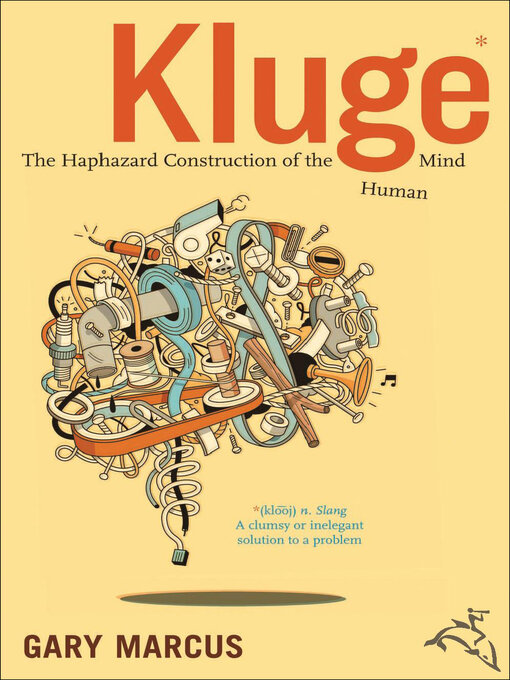- All Magazines
- Popular Magazines: Always Available
- Cooking and Food Magazines
- Craft Magazines
- News and Politics
- See all magazines collections
A New York Times Book Review Editors' Choice
How is it that we can recognize photos from our high school yearbook decades later, but cannot remember what we ate for breakfast yesterday? And why are we inclined to buy more cans of soup if the sign says Limit 12 Per Customer rather than Limit 4 Per Customer?
In Kluge, psychology professor Gary Marcus argues convincingly that our minds are not as elegantly designed as we may believe. The imperfections result from a haphazard evolutionary process that often proceeds by piling new systems on top of old ones—and those systems don't always work well together. The end product is a "kluge," a clumsy, cobbled-together contraption.
Taking us on a tour of the essential areas of human experience—memory, belief, decision making, language, and happiness—Marcus unveils a fundamentally new way of looking at the evolution of the human mind and simultaneously sheds light on some of the most mysterious aspects of human nature.
"Informative and engaging." —New York Times–bestselling author Steven Pinker
"Invigorating fun . . . one of those unexpected analogies that helps us look at everything afresh." —New York Times Book Review
"[A] fresh evolutionary perspective." —New Scientist
-
Creators
-
Publisher
-
Release date
November 21, 2023 -
Formats
-
Kindle Book
-
OverDrive Read
- ISBN: 9780547348087
-
EPUB ebook
- ISBN: 9780547348087
- File size: 988 KB
-
-
Languages
- English
-
Reviews
-
Publisher's Weekly
February 11, 2008
Why are we subject to irrational beliefs, inaccurate memories, even war? We can thank evolution, Marcus says, which can only tinker with structures that already exist, rather than create new ones: “Natural selection... tends to favor genes that have immediate advantages” rather than long-term value. Marcus (The Birth of the Mind
), director of NYU's Infant Language Learning Center, refers to this as “kluge,” a term engineers use to refer to a clumsily designed solution to a problem. Thus, memory developed in our prehominid ancestry to respond with immediacy, rather than accuracy; one result is erroneous eyewitness testimony in courtrooms. In describing the results of studies of human perception, cognition and beliefs, Marcus encapsulates how the mind is “contaminated by emotions, moods, desires, goals, and simple self-interest....” The mind's fragility, he says, is demonstrated by mental illness, which seems to have no adaptive purpose. In a concluding chapter, Marcus offers a baker's dozen of suggestions for getting around the brain's flaws and achieving “true wisdom.” While some are self-evident, others could be helpful, such as “Whenever possible, consider alternate hypotheses” and “Don't just set goals. Make contingency plans.” Using evolutionary psychology, Marcus educates the reader about mental flaws in a succinct, often enjoyable way. -
Publisher's Weekly
June 2, 2008
Evolution seems a rushed process in which traits and attributes of humanity have been pieced together to make a functioning but far from perfect or rational being. Marcus explores the ways in which the human mind, while magnificent in its overall ability, still stumbles on several points. Focusing on areas such as memory, decision making and language, Marcus keenly identifies the makeshift devices humans have created in order to contend with what he describes as "evolutionary inertia." Stephen Hoye traverses the complicated aspects of the book with ease, his melodious voice providing just the right emphasis for listeners to understand Marcus's major points. Yet his delivery misses some of the more humorous elements of the book. And Hoye's lingering voice, which seems to trail off after the end of a sentence, may be good for poetry, but can wear on the nonfiction listener. A Houghton Mifflin hardcover (Reviews, Feb. 11).
-
Formats
- Kindle Book
- OverDrive Read
- EPUB ebook
subjects
Languages
- English
Loading
Why is availability limited?
×Availability can change throughout the month based on the library's budget. You can still place a hold on the title, and your hold will be automatically filled as soon as the title is available again.
The Kindle Book format for this title is not supported on:
×Read-along ebook
×The OverDrive Read format of this ebook has professional narration that plays while you read in your browser. Learn more here.

